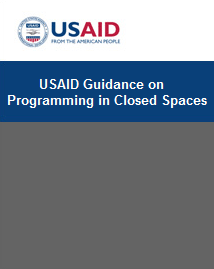For three decades, USAID has served as a global development leader in human rights and democratic governance. It was an integral part of the Agency's work before the Berlin Wall fell, and it has remained so, especially as new challenges have emerged that imperil the expansion of freedom.
In response to these challenges, President Obama launched an initiative called Stand with Civil Society. Speaking in New York this past September, the President reminded us that the most important title is not President or Prime Minister but Citizen. He echoed Dr. Martin Luther King Jr.’s famous words: “The arc of the moral universe is long, but it bends towards justice.” The arc bends, President Obama said, because of the “hands of ordinary people doing extraordinary things every single day.”
There is no better explanation of why USAID has redoubled its efforts to support civil society, especially in countries where political space is closed, closing, or contested. As strong contributors to the Stand with Civil Society agenda, USAID has expanded its partnerships to advocate for strong legal environments in support of civil society, and is joining with civil society leaders to create Civil Society Innovation Centers worldwide to bridge the divide between open and closed societies.
USAID balances two fundamental goals: democratic commitment to transparency and the equally urgent imperative to protect the security of its implementing partners and beneficiaries. While the balancing of these responsibilities is always challenging, carrying out this task in closed or closing spaces is fraught with complex questions of both principle and practice. That is why, through internal and external consultations over the past half-year, the Agency has crafted new guidance.
The purpose of the guidance is to help USAID teams work with its implementing partners to strike the proper balance between these dual goals, and strengthen the ability of the Agency’s senior leaders to oversee this process.
The guidance implicates a very small group of non-presence countries. For these countries, USAID will review existing or prospective programs from the perspective of whether any activities do, or would, require an insufficient level of transparency for their successful execution. The guidance requires balancing transparency and security within specific country contexts.
USAID has already conducted the first review of its existing portfolio. The review’s conclusion was that most of the existing activities are not going to undue lengths to minimize USAID’s role. For the few activities that raised questions, USAID engaged its partners in making changes to the programs in order to restrike the balance between transparency and security.
This guidance stresses two points:
First, the new guidance applies only to countries that meet this explicit criteria. In other tough environments, where USAID has missions on the ground, its staff will continue to balance the needs of transparency and security, while also avoiding undue lengths to minimize the Agency’s role.
Second, USAID will continue to stand by civil society, especially in closing and closed spaces. That means USAID will continue to provide life-sustaining necessities to human-rights defenders who have been ostracized for their bravery; offer opportunities for civil society leaders to study abroad; support citizen engagement on critical development issues; and connect civil society leaders, organizations, and their communities to international networks of solidarity and technical excellence.
The new guidance will strengthen USAID’s ability to provide assistance to civil society in closed spaces with a renewed focus on our abiding goals of transparency and the security of the Agency’s partners and beneficiaries.








Comment
Make a general inquiry or suggest an improvement.